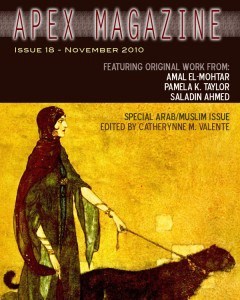 Apex Magazine No. 18
Apex Magazine No. 18
November 2010
“The Green Book” by Amal El-Mohtar
“50 Fatwas for the Virtuous Vampire” by Pamela K. Taylor
“The Faithful Soldier, Prompted” by Saladin Ahmed
Reviewed by Richard E.D. Jones
I could talk about how the November 2010 issue of Apex Magazine is a special issue devoted to Arab/Muslim fiction, but I think I’ll let the stories and poems stand on their own, rather than be seen or discussed as being required to be set apart. So, having already broken that idea in half, let’s get on with the review.
Working in the literary equivalent of the found-footage genre of moviemaking popularized by Cloverfield and Paranormal Activity, “The Green Book” by Amal El-Mohtar walks the reader through rediscovered knowledge that – perhaps – should have stayed lost.
The eponymous Green Book of the title and certain notations on the text found within form the basis of this short story. An apprentice named Dominic is copying down and learning from the books gathered and stored by Master Leuwin Orrerel. All is well until Dominic finds the Green Book.
Contained within the book are words written by a number of different hands, each hand working together to weave a disquieting story. And, thinks Dominic, that is all there is to it. Until new words begin to appear on the page as he watches. New words that talk, specifically, to him.
El-Mohtar does a nice job with the pacing and mood of the story. There is just enough of the strange world surrounding the Green Book revealed to the reader to really draw a nice sense of place without going into explain-everything mode.
This is a very nice piece of work that paints a disturbing picture, especially concerning the collaboration between reader and writer. Recommended.
Pamela K. Taylor voices an interesting question in “50 Fatwas for the Virtuous Vampire.” To wit: Knowing the immortal life of a vampire will eventually come to an end, is it possible for a vampire to live his unlife in accord with God’s laws?
Although interspersed with some sly, witty excerpts from supposed texts designed to help a vampire comply with the laws of Allah, Taylor’s main narrative concerns a vampire’s struggle to remain virtuous, while trying to keep control of his more base instincts.
I really loved the quoted texts Taylor wove throughout her story. They gave an interesting look into the world in which Ibrahim the vampire must live. Ibrahim is attracted to a woman/meal named Lina. He had earlier tried to comply with Allah’s law to only feast on the wicked, but he is so tired of tasting their sin in their blood.
While I wasn’t completely satisfied with the resolution of the moral quandary at the heart of the story, I still felt it was a well-written, involving exploration very much worth taking.
Playing out across the background of a topically relevant world crushed by the global credit crisis gone even more wrong, “This Faithful Soldier, Promoted” by Saladin Ahmed is a very nice piece of writing.
Ali is a retired soldier, trying to live past his memories of atrocities perpetrated during the Global Credit Crusade, the sputtering wetware OS in his brain that still spits out random messages, and trying to find peace with the joy his wife, Lubna, brings to his life in Free Beirut. And then his world comes crashing down around his ankles.
Lubna contracts a terminal – but expensively curable – disease and all Ali’s money must go toward simply maintaining her health. There is nothing left to purchase the cure. Ali is lost until his OS spits out a message telling him to travel down the Old Cairo Road – a dangerous journey at the best of times – and present himself at the charity yard of a mosque.
Ali has no choice. If there is even a possibility that his glitchy wetware OS might be right, he must make the dangerous journey.
There were some extremely dexterous touches scattered throughout this story, especially in the fusion of God and mammon found in such phrases as “In the name of God, Who needs no credit rating. . . “
Ahmed’s world building was really quite excellent and brought with it a suitably exotic background over which the story of Ali and Lubna played out. While the characters interacting with Ali were made of slightly thicker than normal cardboard, Ali’s vivid interior life and struggle made up for that.
The ending was, I thought, a bit weak, but didn’t detract too significantly from my enjoyment of the rest of the story.
Overall, this was quite a nice issue for Apex. With three stories, each playing out in an exotic-to-Westerners background, the specially themed issue made for a very interesting read.